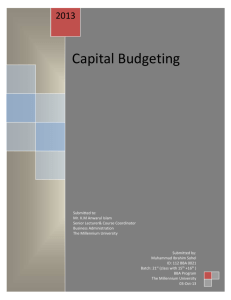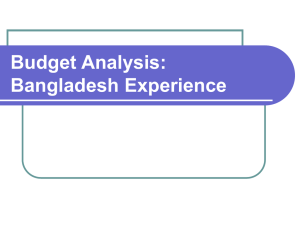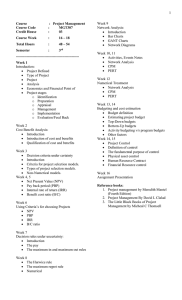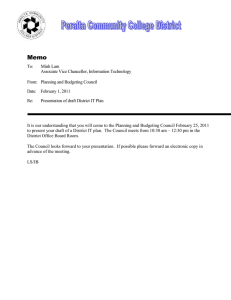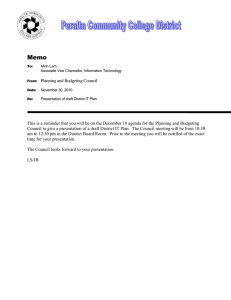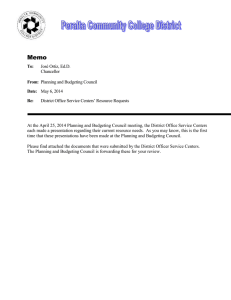URI_Al.doc
advertisement
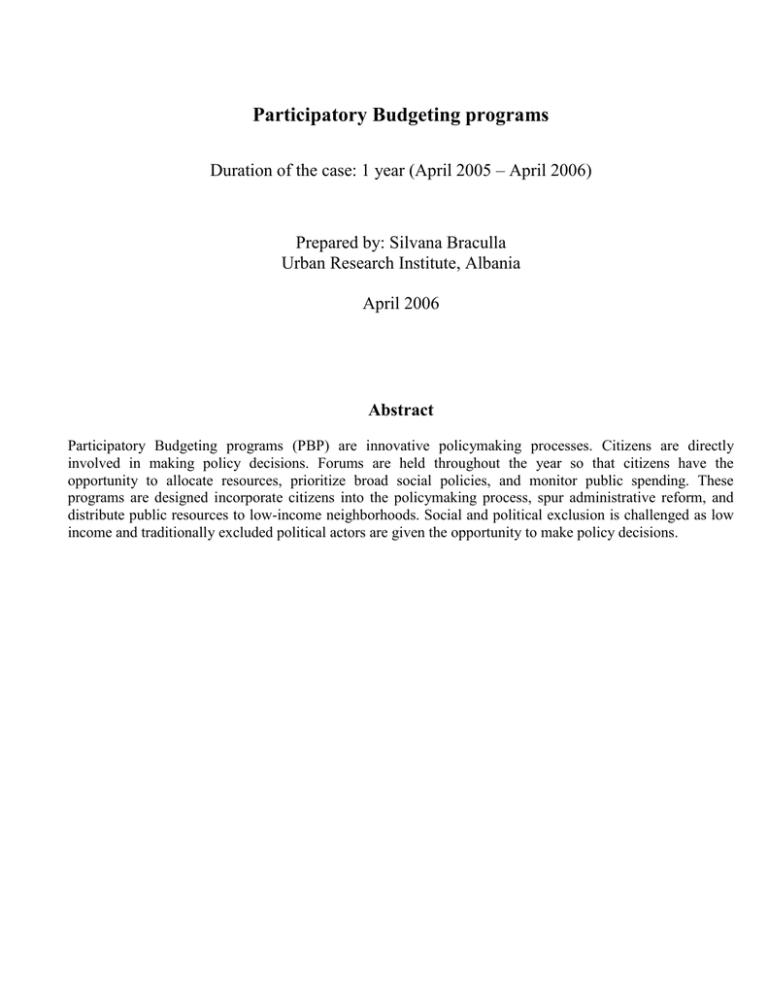
Participatory Budgeting programs Duration of the case: 1 year (April 2005 – April 2006) Prepared by: Silvana Braculla Urban Research Institute, Albania April 2006 Abstract Participatory Budgeting programs (PBP) are innovative policymaking processes. Citizens are directly involved in making policy decisions. Forums are held throughout the year so that citizens have the opportunity to allocate resources, prioritize broad social policies, and monitor public spending. These programs are designed incorporate citizens into the policymaking process, spur administrative reform, and distribute public resources to low-income neighborhoods. Social and political exclusion is challenged as low income and traditionally excluded political actors are given the opportunity to make policy decisions. Background The PBP has been tailored according to the budgeting cycle of Local Government units in Albania. The budget cycle has two main phases: (a) From June to August the budget is formulated at the local level, adopted by the local council and submitted to central government; and, (b) From December to February the budget is reviewed by the central government and a final budget is presented for adoption at the local council. The PBP is composed of two phases: 1) Joint Citizen-Government Budget Formulation, and 2) Citizen Budget Monitoring and Local Government Feedback on Budget Expenditure. A comprehensive manual for implementing participatory budgeting in Albanian is currently in development. About the organization For information about the organization please visit www.uri.org.al. Objectives and activities In the Albanian context, where decentralization has started to move ahead, citizens have high expectations of local government (LG), yet they lack awareness of LG roles and responsibilities. As result, LG-s is often held responsible, for the poor quality of many public services, some of which relate to functions of the central government. Criteria for budget allocation are often ad hoc, there is shortage of funds and political negotiations often influence the distribution. Lack of knowledge of LGs in engaging citizens in governance, civic passiveness and fragile local institutions have substantially contributed to citizens’ mistrust and cynicism. Citizen mistrust has also resulted in poor payment of tax, creating a vicious cycle. There is a strong need for a systematic approach to encourage civic engagement in the governance process, helping to build trust, improve local service delivery and tax compliance while aligning policy formulation to people’s needs and aspirations. To address these governance challenges, the World Bank supported pilot activities aimed at building a demand side for better government and strengthening city participation in the governance process in Albania. Participatory Budgeting Pilot (PBP) in Albania, was designed with the objective to improve local governance and accountability in Albania by (1) building the capacity of local government officials and civic groups to engage in consultations that are focused and goal-oriented towards solving community problems; and, (2) on a pilot basis, introducing short and long term mechanisms to institutionalize citizen voice in government decision making. The long-term objective is to create opportunities for social inclusion in public decision-making. Description of the implementation The implementation of the PBP went through two phases: 1) Joint Citizen-Government Budget Formulation, and, 2) Citizen Budget Monitoring and Local Government Feedback on Budget Expenditure. 1. Joint Citizen-Government Budget Formulation started with the Preparatory groundwork which is important on starting the Participatory Budgeting. It included: Process Mapping o Preparatory Meetings Local meetings of interest groups and initiatives o Project Implementation Workshop to understand the aims of the initiative of the project Training of Local Staff o Municipal Training To increase capacities for the municipal staff so they understand the financial situation of the municipality o Workshop with the Council Members to inform the city councilors about the Participatory Budgeting Project Preparing the Procedures and Responsibility agreement (PB Rules) Designing Communication and Outreach Campaign o to inform the key stakeholders of LG bodies and administration and heads of villages, community Facilitation Community Mobilization o Training of Local Facilitators Build the capacity of local facilitators to mobilize community and moderate public meetings Preparation of the Budget Forecast and Evaluation of current Budget Implementation 2. Citizen Budget Monitoring and Local Government Feedback on Budget Expenditure went through various steps including: Identification of the projects for monitoring o Normally, all projects must be monitored, anyhow on the PBP few of the projects were selected for monitoring. In order to select those projects a set of criteria was established such as: the number of beneficiaries the project was chosen from representatives from more than half of areas the project was one of the priorities that was included in the budget the project that was replicable in the future Establishment of the monitoring groups o According to the established areas and the selected projects for monitoring, the monitoring group is elected either by the community through voting system or nominated by the LG representatives. Capacity Building for the monitoring group o A series of trainings was organized with the monitoring group members and local facilitators in order to build capacities on monitoring and evaluation procedures. The topics include issues such as: procedures, instruments and methodologies that were used on Monitoring of Public Works Process, documents that should be drafted by the work group and Guidelines on how to fill those documents etc… Procurement monitoring o The monitoring group participates actively in the procurement procedures for the selected projects. At the end of the procurement procedures a report was prepared to inform the community on the procurement procedures specifics in order to increase the transparency. Projects inspection and its evaluation o The monitoring members for each area complete the inspection for three phases: 1) When the project starts, this includes the procurement monitoring as well as the starting date of the project; 2) During the implementation, this includes the monitoring of the key elements (the instruments and tools that were used during this phase for the monitoring were friendly use so the ordinary citizens could use them, the communication with the local government bodies for the monitoring activities was very important during this phase); 3:The end of the work is the phase of the public work hand over. Evaluation during the warranty period o The monitoring group members were trained and oriented to evaluate the public work after the completion and in the period known as the warranty period. This period is included in the contract which is signed between the local government representatives and the private entity. During this period any defect was reported and fixed by the private entity in charge of the project. In these cases the monitoring group members prepared the evaluation reports where they include the indicators as well and through these reports they inform the local government units as well as the community. Impact, Results and Lessons learned Impact The PBP activity tests mechanisms that increase citizen participation in decision making in the local budget process in Albania. The desired outcome of the participatory budgeting method is to provide citizens with an opportunity to participate in the financial decision-making process of local government and test mechanisms that foster this participation. Participation rises more quickly when the government commits significant support and resources to the PB. Participation appears to rise because citizens realize that there is a direct connection between the time they dedicate to PB and changes in policy outcomes. Citizens that did not initially participate in PB are drawn into the process, as it becomes clear that the principal way to secure public works or changes in broader social policies is through participation in PB. PB programs act as “citizenship schools”. The first stage of the PB process, at the beginning of the yearly budgetary cycle, mainly consists of information meetings. These meetings provide governments, NGOs and the most well-informed activists the opportunity to discuss matters pertaining to the budget, government authority and responsibility, taxation and citizenship rights (social, political and civil rights). New citizens are inundated with information while long-time participants sharpen their own understandings. During the initial ‘empowerment’ meetings, participants are taught about their rights, their duties as citizens and the responsibility of the government. Lessons learned PB does not imply substantial extra costs for LGs, but it requires commitment and time from staff. o Talking about time, it was difficult in this phase since the LGU staff was involved a lot in the electoral campaigns for the parliamentary elections. o Talking about skills, PB requires attitudes changes in technical staff to learn how to dialogue with people During the establishment of the monitoring groups we have to be careful with the members. Of course we need representatives’ form the private sector or businesses but sometimes it’s tough to have their commitment due to their busy schedule. So we have to be careful with the number of the members with such background. Commitment and leadership to involve citizens in decision making o Need to avoid reinforcing paternalism. o In one of communes the head of commune promised to do everything and even if the monitoring group is established the work hasn’t started yet. This because the monitoring group is not involved and the head of the commune likes to do everything himself and doesn’t delegate. Contacts information Silvana Braculla, Urban Research Institute, Rr. Reshit Petrela, Sek. 1, Kati 9, Ap. D, Tirana Tel./Fax: (355-4) 256 840; e-mail: sbarculla@uri.org.al
